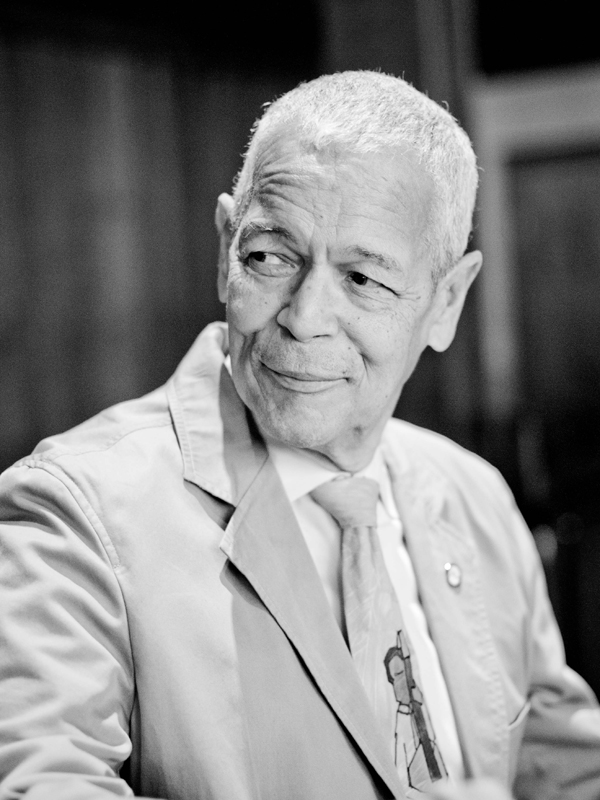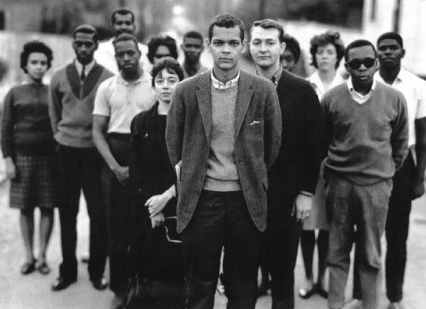www.aljazeerah.info
Opinion Editorials, August 2015
Archives
Mission & Name
Conflict Terminology
Editorials
Gaza Holocaust
Gulf War
Isdood
Islam
News
News Photos
Opinion Editorials
US Foreign Policy (Dr. El-Najjar's Articles)
www.aljazeerah.info
Thank You Julian Bond:
A Story About the Georgia Delegate to the 1968 Democratic Convention
By James Zogby
Al-Jazeerah, CCUN, August 29, 2015
 |
 |
| Julian Bond, the Georgia Delegate to the 1968 Democratic Convention | Julian Bond, WW II drafting |
When Julian Bond died last week, every major news outlet featured tributes praising his more than five decades of leadership in the struggle for civil rights. He was all the things that were said about him. He was courageous and visionary, a steady hand and a thoughtful strategist, and a tireless and eloquent voice for justice for all who were denied their rights.
But for me, Julian was more. He was a mentor who more than four decades ago taught me a lesson that has guided my work ever since. I have told the story before of my first meeting with Julian Bond back in 1973. But because I believe it remains so very relevant, I want to share Julian's lesson one more time.
The story begins at the 1968 Democratic Convention in Chicago, IL. In the months preceding the Convention, the country had been shaken by a series of traumatic developments. Martin Luther King, Jr. had been assassinated in April. Three popular anti-war Senators (Eugene McCarthy, Robert Kennedy, and George McGovern) were running strong campaigns against then-President Lyndon Johnson—opposing his Vietnam War policy. Their combined successes ultimately forced Johnson to announce that he would withdraw from the contest. And then, in early June, Kennedy was assassinated.
When Democrats gathered in Chicago, in August, they were still reeling from the shock of these events. The Convention itself was a tumultuous affair that brought together all of the conflicting currents of the period.
Outside of the Convention, there were massive demonstrations against the war in Vietnam coupled with substantial gatherings of "counter-culture" activists. At one point, the demonstrations were confronted by a shameful display of police/military force. A battle ensued. There were tanks in the streets, beatings and tear-gassing of protesters who chanted "the whole world is watching” because what was playing out in the streets of Chicago was reminiscent of scenes of uprising and repression that had occurred behind "the Iron Curtain".
These same currents played out inside the Convention. As the proceedings began, there was a battle over which delegation should receive credentials to represent the state of Georgia—an all white group, or a mixed-race delegation that included Julian Bond. There was some drama, but in the end, the integrated slate won the right to be seated.
Then came a platform fight over a plank to oppose the war in Vietnam. It became as heated as the demonstrations on the outside. The anti-war plank was defeated, but in a last ditch effort to continue their protest, party progressives decided to contest the party regulars' handpicked choice for Vice-President, Senator Ed Muskie. They put Julian Bond's name in nomination as their candidate to run on the ticket with the party's Presidential nominee, Hubert Humphrey. Humphrey, who, as a Senator had a sterling record in civil rights and labor rights, had served as Johnson's Vice-President and was, therefore, viewed with suspicion by anti-war Democrats.
The party regulars who supported Muskie were too strong and won the day. Outraged by the way their concerns had been ignored by the party leadership and by the use of brute force against the demonstrators, the anti-war delegates had their say in demonstrations on the floor of the Convention—chanting the name of their candidate "Julian Bond". In a crude attempt to regain control of the proceedings, the convention's leadership brought in police who used unconscionable force to bring order.
On the final day of the Convention after Humphrey and Muskie had delivered their acceptance speeches and stood center-stage amidst the balloons and confetti and cheers from the party regulars, a remarkable thing occurred. Onto the stage walked Julian Bond. He went over to Humphrey and Muskie and joined hands. Like many young activists, at the time, the scene left me bewildered and devastated.
A few years later, I met Julian Bond. He had come to lecture at a college where I was teaching. I asked him why he walked out onto the stage that night and told him how let down I had felt.
In response, he told me that there were two types of people. There were those who looked at the evils of this world like war, racism and oppression and said, "I'm going to stand on my principles because it’s got to get a lot worse before it gets any better", and then there were those who would say "I’ve got to get to work to see if I can make it at least better."
“I’m with the second group,” he told me, “because if I took the first view I would be allowing too many people to continue to suffer while I, maintaining my ideological purity, refused to do anything to help them.”
"At that point in the convention", he continued, "it was no longer Julian Bond versus Ed Muskie. It was Hubert Humphrey versus Richard Nixon and I had to make a choice as to who would help make life at least a little bit better.”
I never forgot that lesson and am challenged daily to apply it. It is the reason why I have so little patience for ideologues from theright or the left. They wear their purity with great pride. They arrogantly dismiss those with whom they disagree and never see the need to engage differing opinions. Because they see themselves as bearers of the only truth, they are quick to denounce others, as they say, "with clarity and conviction."
From high on their pinnacle of purity, they often miss the muck of the reality in which most of us live and the tough and often less than perfect choices with which we are confronted in the never-ending challenge we face to make life a little bit better –whether in the struggle for human rights, improvements in the quality of life, or the provision of security and justice for those who are most vulnerable.
http://www.aaiusa.org/thank_you_julian_bond?utm_campaign=wash_watch8_24&utm_medium=email&utm_source=aai
***
Share this article with your facebook friends
|
|
|
|
||
|
||||||


